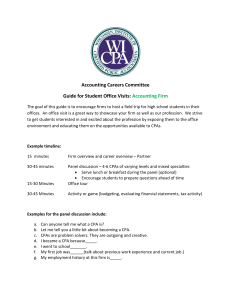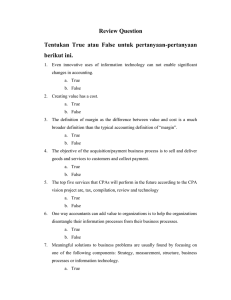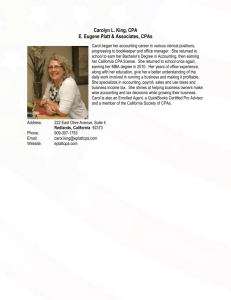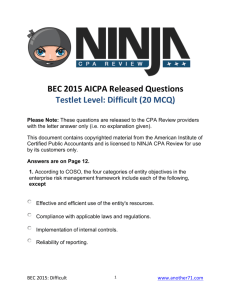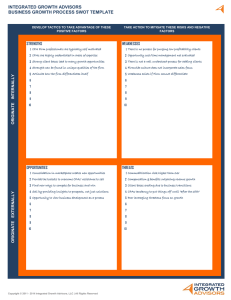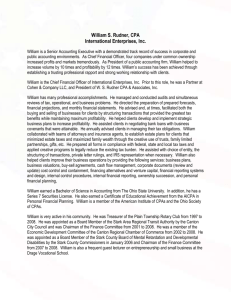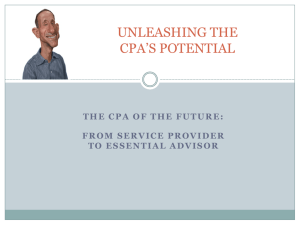candidate chronicle - Texas State Board of Public Accountancy
advertisement
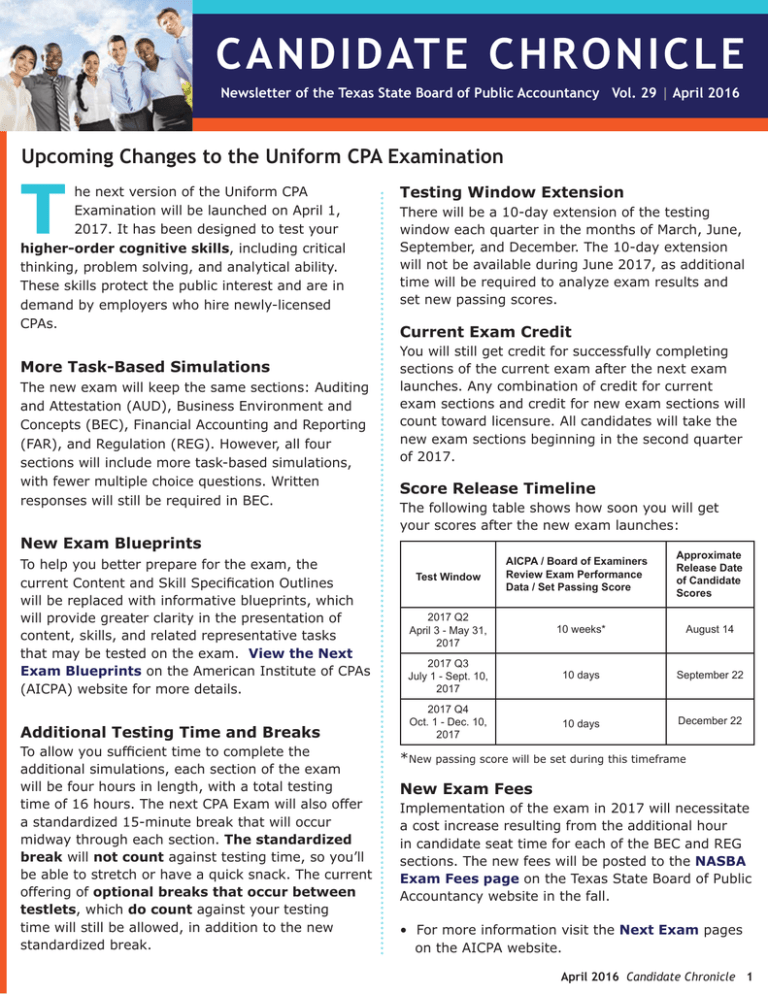
CANDIDATE CHRONICLE Newsletter of the Texas State Board of Public Accountancy Vol. 29 | April 2016 Upcoming Changes to the Uniform CPA Examination T he next version of the Uniform CPA Examination will be launched on April 1, 2017. It has been designed to test your higher-order cognitive skills, including critical thinking, problem solving, and analytical ability. These skills protect the public interest and are in demand by employers who hire newly-licensed CPAs. More Task-Based Simulations The new exam will keep the same sections: Auditing and Attestation (AUD), Business Environment and Concepts (BEC), Financial Accounting and Reporting (FAR), and Regulation (REG). However, all four sections will include more task-based simulations, with fewer multiple choice questions. Written responses will still be required in BEC. New Exam Blueprints Testing Window Extension There will be a 10-day extension of the testing window each quarter in the months of March, June, September, and December. The 10-day extension will not be available during June 2017, as additional time will be required to analyze exam results and set new passing scores. Current Exam Credit You will still get credit for successfully completing sections of the current exam after the next exam launches. Any combination of credit for current exam sections and credit for new exam sections will count toward licensure. All candidates will take the new exam sections beginning in the second quarter of 2017. Score Release Timeline The following table shows how soon you will get your scores after the new exam launches: AICPA / Board of Examiners Review Exam Performance Data / Set Passing Score Approximate Release Date of Candidate Scores To help you better prepare for the exam, the current Content and Skill Specification Outlines will be replaced with informative blueprints, which will provide greater clarity in the presentation of content, skills, and related representative tasks that may be tested on the exam. View the Next Exam Blueprints on the American Institute of CPAs (AICPA) website for more details. 2017 Q2 April 3 - May 31, 2017 10 weeks* August 14 2017 Q3 July 1 - Sept. 10, 2017 10 days September 22 Additional Testing Time and Breaks 2017 Q4 Oct. 1 - Dec. 10, 2017 10 days December 22 To allow you sufficient time to complete the additional simulations, each section of the exam will be four hours in length, with a total testing time of 16 hours. The next CPA Exam will also offer a standardized 15-minute break that will occur midway through each section. The standardized break will not count against testing time, so you’ll be able to stretch or have a quick snack. The current offering of optional breaks that occur between testlets, which do count against your testing time will still be allowed, in addition to the new standardized break. Test Window *New passing score will be set during this timeframe New Exam Fees Implementation of the exam in 2017 will necessitate a cost increase resulting from the additional hour in candidate seat time for each of the BEC and REG sections. The new fees will be posted to the NASBA Exam Fees page on the Texas State Board of Public Accountancy website in the fall. • For more information visit the Next Exam pages on the AICPA website. 1 April 2016 Candidate Chronicle 1 Critical Skill Sets for the Exam and Beyond In addition to the education and work experience requirements that are needed to pass the Uniform CPA Examination, a variety of specialized skill sets are just as equally important. The next version of the CPA Exam will focus on higher order skills. Task-based simulations in the exam will have more data and background material that will require you to determine what information is, or is not, relevant to the test question. The 2017 exam will also have a skills-based framework consistent with the revised Bloom’s Taxonomy. Mastering higher order skills and other technical skills and knowledge is essential to become a CPA, serve the public, and be successful throughout your career. Are you familiar with the Core Competencies of the profession? The American Institute of Certified Public Accountants (AICPA) defines core competencies as a “unique combination of human skills, knowledge and technology that provides value and results to the user. Enhancing our Core Competencies is key to sustaining a competitive and differential advantage in the marketplace.” In 2010, the AICPA reviewed and refined the CPA profession’s Core Competencies based on the feedback it received from CPA Horizons 2025 research project participants. The project included an online survey, 16 in-person forums, and online discussion and focus groups. About 5,600 CPAs responded and the AICPA received over 75,000 comments about the current state and future of the profession. According to the AICPA, “The results, which follow, reflect the foundation of the unique strengths and qualities, which will continue to drive and distinguish the profession in the coming decades.” • Critical-Thinking and Problem Solving Skills: CPAs are skillful in evaluating facts, challenging assumptions, and applying judgment to develop relevant solutions. • Anticipating and Serving Evolving Needs: CPAs are adept in identifying strategic directions and opportunities to meet the evolving needs of those who are served. • Synthesizing Intelligence to Insight: CPAs are expert in connecting data, performing analysis, and using business acumen to provide astute guidance for better business decision making. • Integration and Collaboration: CPAs are effective at building strategic alliances and working collaboratively to provide multidisciplinary solutions to complex problems. • Life-Long Learners: CPAs understand that education will remain a cornerstone as an ongoing activity throughout their career. CORE COMPETENCIES • Communication Skills: CPAs are able to effectively exchange reliable and meaningful information, using appropriate context and interpersonal skills. • Leadership Skills: CPAs are adept at influencing, inspiring, and motivating others to facilitate change and achieve excellence. • Understanding Technology: CPAs understand that there is an increasing prevalence of mobile technology, faster networks, and up-to-date information, and also the potential for errors and fraud in the creation of information. • Soft Skills: CPAs have a strong work ethic; are able to self-manage; are skilled in conflict resolution, research, and project management; are highly adaptable; and are able to work independently and on a team. April 2016 Candidate Chronicle 2 Are You Moving? Exam Fees, as of April 2016 When you apply to take a section of the Uniform CPA Exam, you will pay fees to both the Texas State Board of Public Accountancy and the National Association of State Boards of Accountancy. All fees are non-refundable and non-transferable. TSBPA Exam Fees: $20 per Exam Section NASBA Fees by Section: AUD BEC FAR REG $193.45 $173.60 $193.45 $173.60 Whether you move next door or across the country, you will want to keep the Board informed. Here’s how: • Online under “Online Services” at www.tsbpa.texas.gov • Email: exam@tsbpa.texas.gov • Phone: 512-305-7851 Attention: Exam Candidates and Accounting Students If you are dealing with alcohol or drug dependency problems or mental health issues, you can get help from the Accountants Confidential Assistance Network (ACAN). ACAN volunteers are CPAs who have had first-hand experience with these same issues and who understand what you are dealing with. Don’t hesitate to get the help you need. All communications are confidential. For help, call 1-866-766-2226 Administered by the Texas Society of Certified Public Accountants and Funded in Part by the Texas State Board of Public Accountancy. Additional Volunteers Needed ACAN needs volunteers across the state. If you are in recovery and interested in volunteering, please call 1-866-766-2226. Legal Notice: The identity and communications and the fact of membership of anyone attending this group are confidential and protected under penalty of law under Chapter 467 of the Texas Health and Safety Code. The Candidate Chronicle is published twice annually for CPA Exam candidates in Texas by the Texas State Board of Public Accountancy www.tsbpa.texas.gov April 2016 Candidate Chronicle 3
